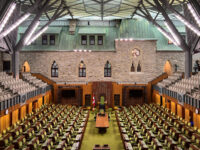Innovation, Science and Industry Minister François-Philippe Champagne has worked hard to fashion himself as a future party leader based on boundless energy to sell Canada the world. Indeed, Champagne’s oft-repeated stories of cold calls that resulted in investments by companies such as Volkswagen and Moderna paint a picture of a minister jetting around the world in support of the Canadian economy. Unfortunately, Champagne’s record is also one of a minister less interested in what is actually happening at home. His privacy legislation has languished for months and he has been entirely missing on digital policy, where fishing expeditions such as the one involving Bill C-18 are likely to make companies reticent about entering the Canadian market. This morning there was another lasting and damaging development as the approval of Rogers-Shaw merger (or more accurately the approval of the transfer of licences that pave the way for the merger) will mean that Champagne will have presided over the destruction of the competitive communications market with both another major merger and the sudden disappearance of many independent providers.
Post Tagged with: "telecom"
The Law Bytes Podcast, Episode 154: The House is Back – A Preview of Canadian Digital Policy as Parliament Resumes
The House of Commons and Senate return from a lengthy break this week and will likely run until late June with the occasional week or two off. Digital policy may not attract top line attention, but it has emerged as one of the government’s most active issues. This week’s Law Bytes podcast provides a preview of the upcoming session, looking at what may lie ahead for issues such as telecom policy, privacy reform, Bills C-11 and C-18, copyright, and trade policy.
The Staffieri or Scott Quiz: Can You Tell the Difference Between the Rogers CEO and the CRTC Chair?
The Standing Committee on Industry, Science and Technology hearing into the Rogers outage was notable for how similar Tony Staffieri, the Rogers CEO, and Ian Scott, the Chair of the CRTC, sounded on key issues related to the outage and the state of Canadian telecom regulation. In fact, Conservative MP Tracy Gray noted during the hearing that “listening to the answers from the executives at the CRTC, I felt like I was actually questioning senior telecom executives not the regulator.” Ms. Gray wasn’t wrong. While it is obviously the role of the CRTC to regulate the industry, the two were often indistinguishable, leading me to create this quiz with actual quotes from the hearing from Staffieri and Scott. Can you tell the difference?
The CRTC Shrugged: A Special Law Bytes Podcast on the Industry Committee Hearing Into the Rogers Outage
The Rogers outage came to Parliament Hill yesterday as the Standing Committee on Industry, Science and Technology conducted four hours of hearings into the issue. The day started with Innovation, Science and Industry Minister Francois-Philippe Champagne, followed by Rogers CEO Tony Staffieri, CRTC Chair Ian Scott, and a panel of consumer and public interest voices. I was pleased to be part of the final panel and I’ve posted my opening remarks below and created a special Law Bytes podcast featuring my opening remarks and the question and answer session with MPs.
The Rogers Outage Aftermath: What Else Should Be On Minister François-Philippe Champagne’s Telecom To-Do List?
The massive Rogers outage took centre stage yesterday as CEOs of the leading telecom companies met with Innovation, Science and Industry Minister François-Philippe Champagne to discuss next steps to reduce the likelihood of a similar event in the future. My initial post on the outage focused on three main issues: conducting hearings into the issue by both the CRTC and a House of Commons committee, competition policy, and consumer compensation. None of these issue were top of mind for the companies or Minister, who instead emphasized the need for agreements among the companies within 60 days on emergency roaming, mutual assistance during outages, and a communications protocol to better inform the public and authorities during telecommunications emergencies. The Minister also noted that there will also be a CRTC investigation.
While these are all useful steps largely modelled on similar developments in the United States, even Champagne acknowledged that this is “just a first step.” So what else should be on the government’s to-do list?











